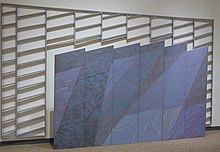Career
Stuart's work with sewn and acrylic stained canvasses began in the early 1960s, constructed works on paper in the 1980s, and scroll paintings in 2000. While focusing on these three bodies of work she expanded concepts and expressive forms in explorations of recycled glass, found and fabricated vacuuforms and collaged Tyvek. The latter resulted in large temporary walk-through installations - InSilence 1 and 2.
In 1971, she joined the visual arts faculty at South Dakota State University, (Brookings, SD) where she taught until her retirement in 1994 as professor emerita. She was a visiting artist at Williams College, MA, Kansas State University, Moorhead State University, MN, Connecticut College, West Texas State University, Ucross Foundation Residency, WY, and Cowles Visiting Artist at Grinnell College, IA. In 1994, she moved to Santa Fe, NM.
James Yood said of Stuart's South Dakota years: “The space of nature began to loom larger and larger in Stuart’s work as her time in South Dakota advanced, and it is not too much to see in her work of the 1980s some of the expanse of the Great Plains, the grand sweep of a panoply of nature.”[2]

In addition to nature, Stuart found inspiration in other art forms, particularly Japanese art. “Many of her paper-based works use traditional Chinese and Japanese materials, such as mulberry and unryu paper and sumi ink. … The prominence of negative space in Stuart’s art … also echoes Asian aesthetics’ allusion to the void, the emptiness which contains all and carries as much meaning as painted or constructed surfaces.”[3]
From 1989 to 2014, Stuart created several room size installations incorporating sound, light, and sensors, utilizing industrial materials of Styrofoam, Tyvek, and vacuuforms. These environments focused on diverse connective systems and cultural interventions in nature.
Onomatopoeia, one of Stuart’s 60-foot-wide abstract narrative scroll paintings was the subject of a chamber music composition by composer, Jonathan Chenette (Vassar College, Poughkeepsie, NY). Onomatopoeia premiered with a performance at the Albuquerque Museum of Art and History in 2010 in conjunction with the exhibition Crossing Boundaries: Synesthesia in American Art.
During her career, Stuart has been the recipient of a National Endowment for the Arts Painting Fellowship (1976), two National Endowment for the Arts mural commissions (1977 and 1985), a South Dakota Arts Council Artist Fellowship (1986) and a New Mexico Experimental Glass Workshop Fellowship (2012). Art critics and gallery directors place Stuart’s work in a broad context beyond the geographic residency of her career. “She emphasizes continuity, endlessness, surge, and strives for a broader concept of form through a-compositional devices and a tough, sometimes subliminal, and always subsidiary use of color,” Jan van der Marck observed in artscanada.[4]
Laurel Reuter, Director, North Dakota Museum of Art, felt Stuart became known “for her superb instinct for color, for her predilection for sparseness, and for her painted constructions of canvas and paper, both large and small. … Hers is a work of connections. It also suggests that here is an artist whose most recent painting is underpinned by everything she ever knew.”[5]
Donald Doe, curator, patient process 2001 exhibition at Grinnell College Museum writes, “For Stuart, who reads on topics ranging from the process of evolution to sub-atomic motion, her real enterprise seems a process of exploration that is not easily made verbal, a way, she says, of offering a “meta language that uncovers the nature of materials.”[6]
Jan Adlmann placed the artist in distinguished company. "Stuart's resolutely non-objective, mesmerizing paintings on stitched canvas have long been admired in Santa Fe. Her work and, before that, the work of [Georgia] O'Keeffe, Agnes Martin, and Florence Pierce ... have raised the bar of serious art in this city ..."[7]
